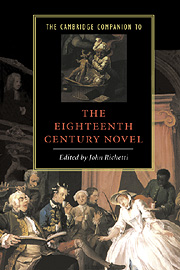Book contents
- Frontmatter
- 1 Introduction
- 2 The novel and social/cultural history
- 3 Defoe as an innovator of fictional form
- 4 Gulliver's Travels and the contracts of fiction
- 5 Samuel Richardson
- 6 Henry Fielding
- 7 Sterne and irregular oratory
- 8 Smollett's Humphry Clinker
- 9 Marginality in Frances Burney's novels
- 10 Women writers and the eighteenth-century novel
- 11 Sentimental novels
- 12 Enlightenment, popular culture, and Gothic fiction
- Index
8 - Smollett's Humphry Clinker
Published online by Cambridge University Press: 28 May 2006
- Frontmatter
- 1 Introduction
- 2 The novel and social/cultural history
- 3 Defoe as an innovator of fictional form
- 4 Gulliver's Travels and the contracts of fiction
- 5 Samuel Richardson
- 6 Henry Fielding
- 7 Sterne and irregular oratory
- 8 Smollett's Humphry Clinker
- 9 Marginality in Frances Burney's novels
- 10 Women writers and the eighteenth-century novel
- 11 Sentimental novels
- 12 Enlightenment, popular culture, and Gothic fiction
- Index
Summary
If Tobias Smollett is a more important figure now than he used to be, it is not because his novels seem any better now than they did thirty years ago. Neither the first, Roderick Random (1748), nor the last, The Expedition of Humphry Clinker (1771), have attained the superstar status of Clarissa (1747-48), Tom Jones (1749), or Tristram Shandy (1760-67) - nor are they likely to. But because the kinds of questions entertained by the academy have changed so radically, the terms for assessing importance have also changed. It no longer seems quite so pressing to make a case for one of his “neglected” novels, or to assess his achievement in relation to that of his rival Fielding's, or to ask whether the novels are best described as “picaresque,” or romance, or satire, and in just what amalgam. At least for now, these questions, framed from the traditional perspective of “literature,” have yielded to a different set of concerns. The sleepy “period” that used to be “Augustan” has now become the “culture” of an “early modern England” busily engaged in a multitude of simultaneous construction projects: nationhood and empire; the literary market place and commodity culture; turnpikes and the modern subject.
- Type
- Chapter
- Information
- The Cambridge Companion to the Eighteenth-Century Novel , pp. 175 - 197Publisher: Cambridge University PressPrint publication year: 1996

